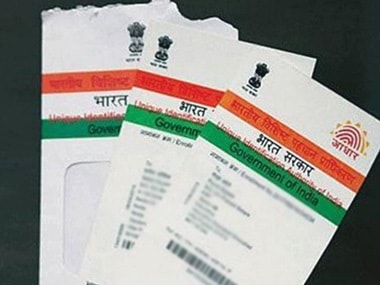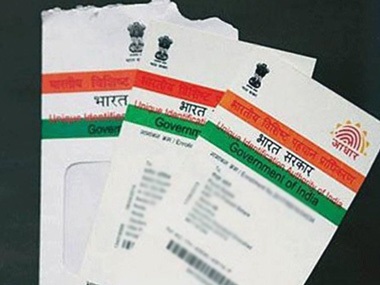New Delhi: The Supreme Court on Thursday asked as to how collection of data by the State under the Aadhaar scheme was different when people voluntarily surrendered details for making payments for insurance, bills and car instalments. The observation was made by a five-judge Constitution bench headed by Chief Justice Dipak Misra which is hearing a batch of petitions challenging the constitutional validity of government’s Aadhaar scheme and the enabling 2016 law. “What if someone else like a bank offered to make all your transactions for you and you give standing instructions, like for insurance payments, bill payments, car instalments etc. What is the qualitative difference? “My bank maintains a central repository of all my transactions. We are constantly entering into a world of surrendering our identity. It may be a choice but it is still a central database. If we are willing to surrender our identity, then does the fact that the State is collecting information make a difference?,” the bench, also comprising justices A K Sikri, A M Khanwilkar, D Y Chandrachud and Ashok Bhushan, said. [caption id=“attachment_4331399” align=“alignleft” width=“380”]  Representational image. CNN-News18[/caption] At the fag end of the day-long hearing, Justice Chandrachud lost his cool after not getting a satisfactory reply to his query from senior advocate Shyam Divan, representing petitioners opposed to the Aadhaar scheme. “The moment we ask questions, we are attacked as we are committed to…If that is so then I plead guilty to the charge. We are not defending the government nor are we going to follow the NGO line,” he said leading Divan to apologise. On the issue of safety and possible misuse of citizens’ information, the bench said if there were norms governing collection and use of such details, then it might allay the apprehensions with regard to the issue of misuse. “This is not a question of checks and balances, because the architecture is that of pervasive surveillance,” Divan said. The lawyer said he was alive to the situation that the country cannot go back to “the pre-digital age”, but the issue was whether a person can be denied his or her entitlements as a citizen for want of the Aadhaar card. The bench said that there were “multiple interfaces” between a citizen and the State such as tax, water and electricity bills etc. “Suppose instead of Aadhaar, you are required to use a PAN card. How would that be different,” the bench asked, adding that the arguments seemed to be that there was a problem with the centralisation of data. It said every time a person uses an Internet device such as Uber, his or her movements are tracked and asked as to what is the “specific additional problem” with Aadhaar. The first problem was the centralisation of data, Divan submitted and referred to a judgement of the European Court of Human Rights (ECHR) and contended that it was one thing that a particular service provider knew your location, but the government might use the centralised data for tracking citizens. He said it was not the case that somebody was sitting behind the screen and watching. The problem was with the “architecture of the programme” which may lead to scrutiny and profiling of citizens, he said. Senior advocate Kapil Sibal, who also appeared for a petitioner opposed to the Aadhaar scheme, said the Aadhaar Act was premised on the principle of “one-nation, one-identity.” “Aadhaar is premised on the assumption that we are a nation of naives. This represents a complete breakdown of trust, because the presumption is that if you don’t have Aadhaar, then you are a crook,” Divan said. He said that the UIDAI violated the principle of the rule of the law and the statutory norm, laid down for collecting demographic data under the Census Act. The Census Act provided that the collected data cannot be used for other purposes, he said. Attorney General K K Venugopal referred to contents in the new Union Budget and said that there was a 41 percent rise in the tax base largely due to Aadhaar. Divan said the Centre, in its affidavit, referred to a World Bank report stating India has an estimated saving of USD 11 billion per annum by using Aadhaar. He also maintained the World Bank report was not authentic as its chief Paul Romer recently resigned saying there was no integrity in its data. The arguments remained inconclusive and would continue on 6 February. The apex court had on 15 December last year extended till 31 March the deadline for mandatory linking of Aadhaar with various services and welfare schemes of all ministries and departments of the Centre, states and Union territories.
The Supreme Court asked as to how collection of data by the State under the Aadhaar scheme was different when people voluntarily surrendered details for making payments.
Advertisement
End of Article


)

)
)
)
)
)
)
)
)



